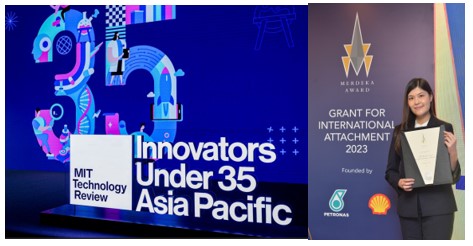
Kuala Lumpur, 13 October 2024– Dr. Kong Xin Ying, has been recognized as the only Malaysian recipient of the prestigious MIT Technology Review’s Innovators Under 35 (TR35) Asia Pacific Award for 2024. This accolade celebrates her groundbreaking contributions to sustainable energy harvesting and environmental remediation by upcycling plastics.

The TR35 Award recognizes 35 exceptional young innovators from across the region who have made significant breakthroughs highlighting their innovative contributions and entrepreneurial acuity in fields such as biotechnology, materials, computer hardware, energy, transportation, communications, and the Internet.
Dr. Kong’s research delves into converting plastic waste into fuels and versatile chemicals using catalysts at ambient conditions. With this method, non-biodegradable plastics which naturally require a hundred to a thousand years to decompose, this solution can shorten the process to just one day. In addition to potentially addressing plastic pollution, this technology can also produce valuable chemicals that serve as solvents, antiseptics, food additives, fragrances and liquid organic hydrogen carriers that efficiently store and release hydrogen. By mining carbon resources from plastic waste instead of extracting them from fossil fuels, early laboratory tests have shown promising results – with the dual benefit of reducing plastic pollution and creating sustainable energy sources. She is currently a researcher fellow with Nanyang Technological University, Singapore.
Dr. Kong said, “Receiving this award is an incredible honour, which recognizes the significance of my work in mitigating plastic pollution with sustainable solutions, and it encourages me to work harder.”
Dr. Kong is the fourth Malaysian to receive this award in the past 10 years, at the event held in Shanghai last month. Past Malaysian recipients include Wei Ru Wong, Researcher at University of Malaya(2020), Dhesi Raja, Cofounder and Chief Scientist, Artificial Intelligence in Medical Epidemiology (AIME) (2017) and Goh Ai Ching, Co-founder of Piktochart (2014).

Dr. Kong also recently made the list of the World’s Top 2% Scientists 2023 determined by Stanford University – making her one of the youngest to be recognised at 32 years old.
Dr. Kong is also one of five recipients of the 2023 Merdeka Award Grant for International Attachment whohas been lauded for her pioneering research in photocatalytic upcycling of plastics. She is set to begin her three-month stint at the Lawrence Berkeley National Laboratory and University of California, Berkeley at the end of this month.
“The Merdeka Award Grant will provide a platform for me to connect and collaborate with leading researchers at renowned institutions worldwide, significantly advancing my work on photocatalytic upcycling of plastics. The exposure and resources from this will allow me to refine my research and its impact for sustainable energy solutions,” said Dr Kong.
Kerina Fauzi, Secretary of the Merdeka Award Trust, remarked, “Dr. Kong’s achievements exemplify the spirit of innovation and excellence that the Merdeka Award seeks to recognize. Her work highlights the potential of scientific research to solve real-world problems, offering transformative solutions to address environmental issues, and inspires future generations of innovators to strive for greatness.”
Merdeka Award Grant for International Attachment Application Opens Soon
The Merdeka Award Grant for International Attachment is offered once every two years. Since its introduction in 2012, the Merdeka Award Grant for International Attachment has supported 29 recipients in the fields of education, health, science, technology, environment, arts, humanities with the opportunity to enhance their expertise and contribute to various fields by collaborating with top-ranked institutions worldwide.
Malaysians between the age of 22 and 35 years old are encouraged to apply at the Merdeka Award – Grant Application site, as the next cycle for the Grant will open from 1 January 2025.
Selected recipients will stand to benefit from full tuition fee, accommodation and travel during the short-term attachment period of up to three months, upon acceptance at the recipient’s institution of choice.